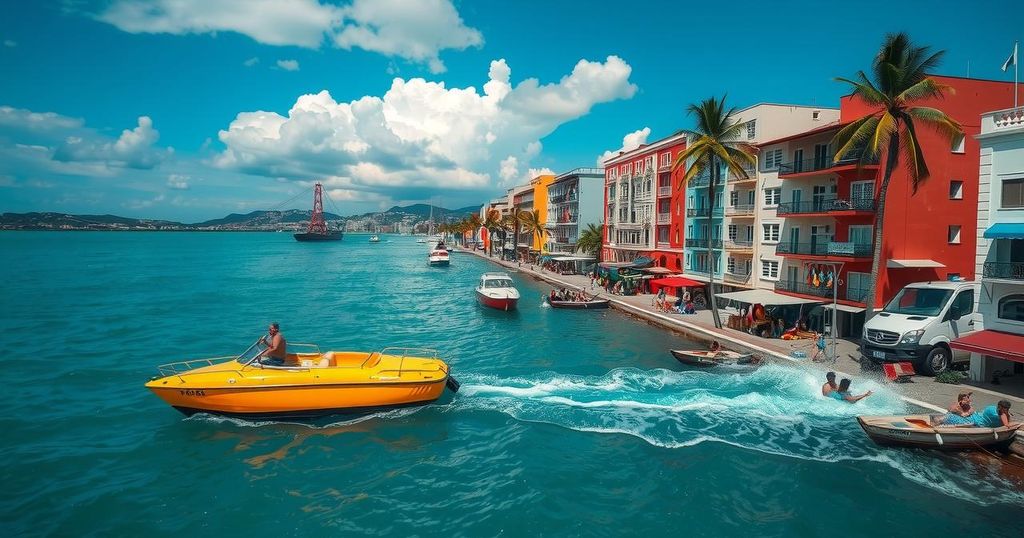Cuba’s tourism faces a sharp decline, particularly from North America and several European countries, with a staggering 73.93% drop in North American visitors since 2019. Key challenges include economic issues, poor infrastructure, and competition from other Caribbean destinations, while some increases in arrivals from Portugal and Russia offer slight hope. Overall, the industry is in crisis, necessitating urgent reforms for recovery.
Cuba’s tourism industry is witnessing a sharp decline, particularly in visitors from North America, Spain, Germany, Mexico, Argentina, and Colombia. In stark contrast to 2019 figures, the arrival of North American tourists dropped from 452,835 to merely 118,038 by 2024, signifying a drastic 73.93% reduction. European tourist interest also diminished significantly. Notably, Portugal and Russia have shown an increase in visitors, which brings a slight glimmer of hope amid the prevailing challenges. Several factors contribute to this downturn, including Cuba’s ongoing economic struggles, inadequate infrastructure, and stiff competition from other Caribbean destinations such as Cancun and Punta Cana.
From January to October 2024, Cuba experienced an alarming 48.23% decline in tourist arrivals compared to 2019, resulting in hotel occupancy rates plummeting to an estimated 25%. The tourism sector, crucial to Cuba’s economy, saw revenue plummet from USD 3,185 million in 2019 to USD 1,216 million by 2023. The decline is particularly pronounced among North American travelers.
Cuban emigration patterns have affected domestic tourism as well, with many Cubans choosing to visit tropical destinations that offer better amenities instead of returning home. Following this trend, a significant portion of travelers who previously visited Cuba have opted to travel elsewhere.
Compounding these issues is the mismanagement of resources by Grupo de Administración Empresarial S.A. (GAESA), which controls much of Cuba’s financial resources. Although GAESA has invested USD 24 billion in tourism, the results have been disappointing as Cuba consistently falls short of its tourism targets, including the unmet goal of 3.5 million tourists in 2024.
Cuba’s energy infrastructure has also deteriorated, leading to frequent power outages that affect both residents and tourists. Health epidemics, increasing crime, poor transportation, and food shortages serve as additional deterrents for potential visitors.
Cuba faces intense competition from other tropical locales, which have become more appealing due to their better facilities, safety, and accessibility. The Cuban government has attempted to rejuvenate the tourism industry by encouraging migration in hopes of increased remittances and visitors, yet challenges persist.
To foster recovery, Cuba must confront systematic issues such as improving crucial infrastructures, diversifying its economic strategies, and developing international relationships to attract airlines and tour operators. While the path to revitalizing its tourism industry is fraught with challenges, there remains significant potential for recovery if the government implements effective measures.
Cuba’s tourism industry, once a thriving a sector, is now struggling with unprecedented challenges. The COVID-19 pandemic heavily impacted global travel, but Cuba’s decline has extended beyond this due to ongoing economic issues, inadequate infrastructure, and competition from more appealing Caribbean destinations. Prior to the pandemic, tourism was a critical component of Cuba’s economy, generating significant revenue and fostering connections with the Cuban diaspora. However, recent statistics reveal a sharp decline in visitor numbers, necessitating urgent reforms and strategic planning within the tourism sector to restore its former prominence and vibrancy.
In summary, Cuba’s tourism industry is experiencing a severe crisis, characterized by significant declines in international visitors, especially from North America, while only minimal increases from Portugal and Russia provide a ray of hope. The compounded effects of mismanagement, inadequate infrastructure, and fierce competition from neighboring destinations illustrate the critical need for reforms. The road to recovery is challenging; however, by prioritizing sustainable development, improving key infrastructures, and fostering international relations, Cuba may reclaim its rightful status as a premier Caribbean destination.
Original Source: www.travelandtourworld.com







